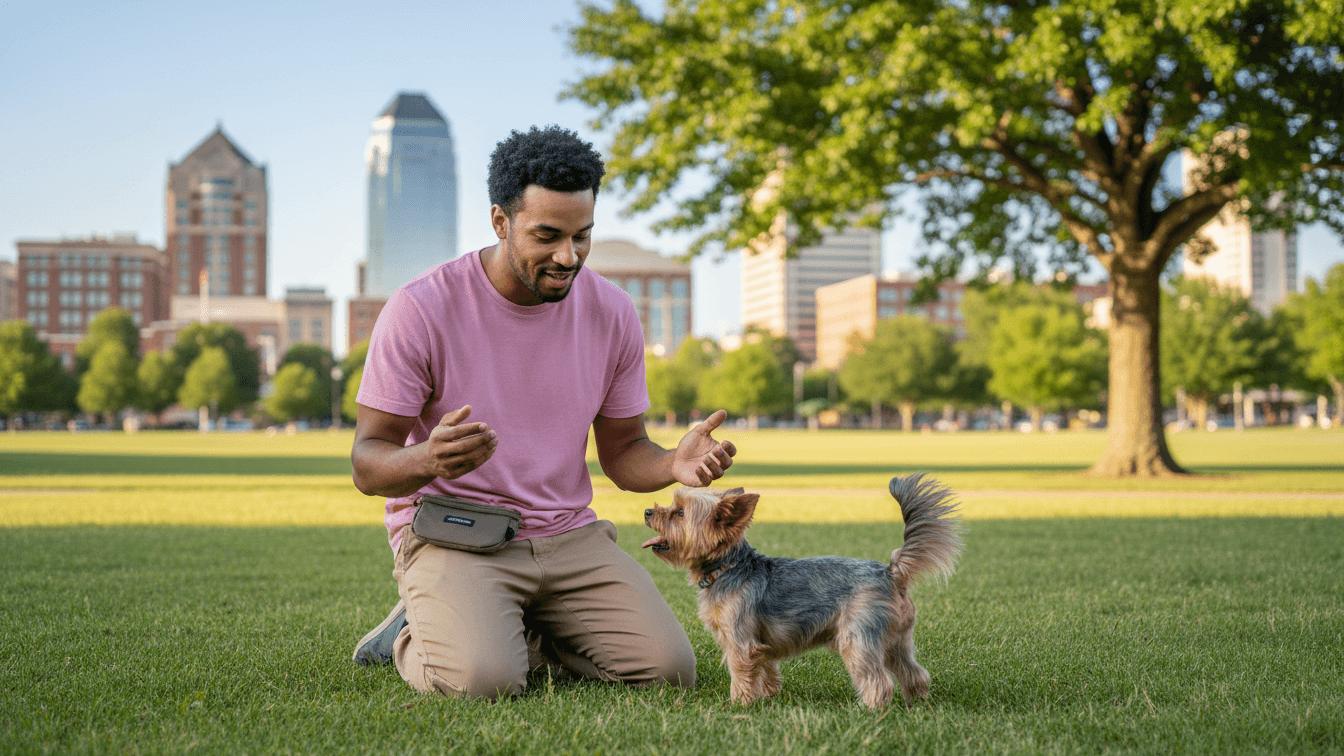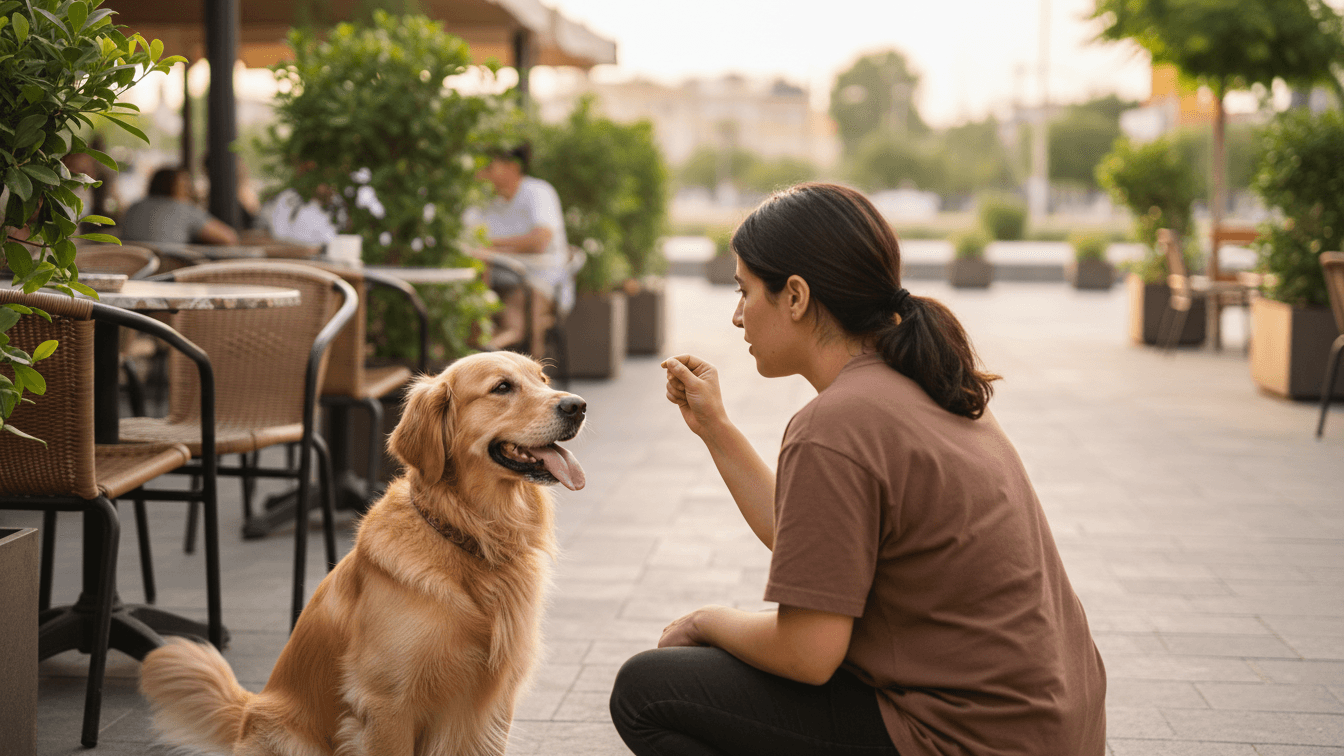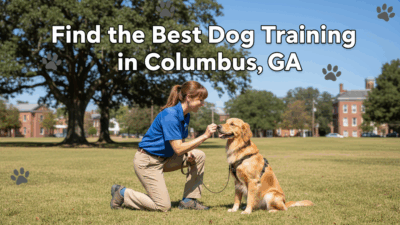Your Complete Guide to Choosing a Dog Trainer in Columbus, GA and Surrounding Areas
Living with a dog in Columbus means navigating the Riverwalk with crowds of tourists, enjoying quiet mornings at the dog parks near Fort Benning, and teaching your pup to stay calm when exploring Uptown’s busy streets. Your dog needs to handle life along the Chattahoochee River Trail, manage the noise of military helicopters overhead, and stay polite when you visit pet-friendly spots throughout Midtown and Wynnton.
Since Columbus sits in Muscogee County, most regulations come from both city ordinances and county-level guidelines. Finding a trainer who understands these local details makes a real difference when you’re working on real-world skills your dog will use every single day.
How to Choose the Right Trainer
Start by finding someone who uses positive reinforcement training and understands what daily life looks like in Columbus. Your dog should learn to walk calmly past runners on the Riverwalk, ignore distractions near the National Infantry Museum, and handle visits to local vets without stress.
Look for credentials that show a trainer’s commitment to ongoing education and humane methods. Common dog trainer certifications include KPA-CTP, CPDT-KA, or IAABC-CDBC for behavior issues. If your dog shows serious aggression or fear problems, consider trainers with CBCC-KA credentials or science-based programs like CTC.
In-home dog training works beautifully for addressing problems where they actually happen, like door-greeting chaos, backyard reactivity toward passing dogs, or teaching your puppy the rules of your household. Group classes become useful once your dog can focus around other dogs, and they’re perfect for practicing polite behavior before trying busier public spaces.
Private lessons give you one-on-one attention and a custom training program built around your specific goals and schedule. Day training lets a professional dog trainer work with your dog during the week, then teach you how to maintain the progress.
Common Dog Training Methods Explained

Reward-based training builds the trust and reliability you need while keeping your dog happy and engaged throughout training sessions. These methods also make it easier to follow Columbus and Muscogee County rules about keeping dogs under control in public.
Basic obedience covers the foundation skills every well-behaved dog needs: sit, down, stay, place, recall, and loose-leash walking. These behaviors help you manage restaurant patios, park visits, and neighborhood walks without your dog pulling or jumping on strangers.
Puppy training focuses on early socialization, potty training, bite inhibition, crate comfort, and gentle leash training. Starting early with puppy classes prevents problem behaviors from taking root and makes everything easier down the road.
Behavior modification addresses serious issues like fear, reactivity, resource guarding, or separation anxiety through careful desensitization and counterconditioning. For complex cases, the best dog trainer will coordinate with your veterinarian to rule out medical causes and develop a complete plan.
Dog training classes offer structured learning in a group setting where your dog practices good manners around distractions. Quality group classes keep dogs at safe distances, screen participants carefully, and teach calm focus rather than just excitement.
Specialized work like therapy dog training or service dog training requires extra structure, public-access skills, and a very clear step-by-step program with measurable goals at each stage.
Avoid any trainer who relies on fear, intimidation, or pain to get results. Humane dog training services are safer for you and your dog, easier to maintain long-term, and much better for keeping peace with neighbors in Columbus’s close-knit communities.
Average Cost of Dog Training in Columbus, GA and Surrounding Areas (Updated for 2025)
Prices in Columbus and Muscogee County vary based on the trainer’s experience, session length, and whether training happens at home, in a facility, or in public spaces. Here’s what most local dog owners are paying in 2025.
| Service Type | Average Cost (Columbus/Muscogee County) |
|---|---|
| Puppy classes (4-6 weeks) | $140-$260 total |
| Group obedience classes (4-6 weeks) | $150-$280 total |
| Private lessons (60-90 min) | $100-$175 per session |
| In-home coaching packages (4-6 visits) | $400-$850 total |
| Day training (trainer works your dog + handoff) | $425-$900 per week |
| Behavior consult for reactivity/anxiety (initial) | $140-$240 |
| Board and train (2-4 weeks) | $1,900-$4,200 total |
You might pay additional travel fees for locations farther from central Columbus, and expect higher rates for aggressive dog training or other complex behavior work. Always ask what’s included in the total price, how progress gets measured, and whether the trainer offers a free consultation before you commit.
Questions to Ask a Potential Dog Trainer
- What training methods do you use, and how do you keep sessions positive and low-stress for my dog?
- What credentials do you hold, like CPDT-KSA or KPA-CTP? How do you stay current with new techniques?
- How will you customize the training program for my dog’s specific needs and our lifestyle in Columbus?
- Do you offer in-home sessions, dog training classes, or day training, and which approach fits my situation best?
- How will we track my dog’s progress and know when to add more distractions or difficulty?
- What are the total costs, including any travel fees within Muscogee County, and what’s your cancellation policy?
- Do you carry liability insurance, and can you provide proof of coverage?
- For behavior problems, will you work with my veterinarian or recommend one if needed?
- What should I practice between our training sessions to help my dog keep improving?
- Do you offer a free evaluation to assess my dog before we start?
Local Columbus Rules and Considerations
Columbus enforces leash laws and nuisance ordinances to keep parks and neighborhoods safe for everyone. Muscogee County follows Georgia’s public health requirements for vaccinations and animal control.
Leashes are required in all public spaces except inside designated off-leash areas. Keep a standard six-foot leash with you for the Riverwalk, public parks, and community events throughout Columbus.
Georgia law requires current rabies vaccination and a valid rabies tag for all dogs. Muscogee County Animal Control handles licensing and tag requirements, and you can find details through their office or your regular veterinarian.
Excessive barking can be reported as a noise nuisance in Columbus, so work with your trainer on alert barking and separation anxiety before complaints arise. If your certified dog trainer wants to use city parks for commercial training sessions, they may need permits and proof of insurance from the Columbus Parks and Recreation Department.
Georgia doesn’t require special licenses for professional dog trainers, but if a trainer runs a boarding facility as part of board and train services, they may need to follow state kennel regulations and inspections through the Georgia Department of Agriculture.
Local Columbus Resources for Dog Owners
These spots give you excellent places to practice obedience training, work on leash training around distractions, and provide safe enrichment for your dog. Always follow posted rules and practice good etiquette.
- The Bark Park at Tom Varn Park offers a fenced off-leash area where dogs can practice recalls and socialization in a safe environment.
- Columbus Dog Park at Lindsey Creek Park provides separate areas for large and small dogs with plenty of space for practicing polite greetings and calm play.
- Flat Rock Park includes paved trails along the Chattahoochee River where leashed dogs can work on focus and loose-leash walking around joggers, cyclists, and other dogs.

FAQs
How much does in-home dog training cost?
Most Columbus trainers charge $100-$175 per in-home visit, with package discounts available when you book multiple sessions. Behavior modification for reactivity or aggression typically starts at the higher end of that range.
Is in-home dog training worth it?
Absolutely, because you’re addressing problems exactly where they happen. Your trainer can help your dog with door manners, jumping on guests, counter-surfing, and backyard reactivity right at home, then step outside to practice leash training on your actual neighborhood streets.
Can you pay someone to house train your dog?
Yes, many trainers offer puppy training programs that include potty training, crate routines, and daily schedules. Day training can speed up the process while teaching you how to maintain consistency after the trainer leaves.
What is the 3-3-3 rule for dog training?
This guideline helps set realistic expectations for new or adopted dogs: expect about three days for your dog to decompress, three weeks to learn your routines, and three months to feel completely settled. A good training program works with this natural adjustment timeline rather than rushing through it.
How long will it take to reach my training goals?
Most puppies and friendly adult dogs show solid progress within four to eight weeks if you practice daily between training sessions. Fear, reactivity, or aggression typically requires several months of careful behavior modification with gradual increases in difficulty and distractions.
What should I bring to group classes?
Pack a flat collar or harness, a six-foot leash, high-value treats, water, and current vaccination records if your trainer requests them. Leave retractable leashes at home for safety reasons, since they make it harder to keep dogs at safe distances.
What’s the leash law in Columbus?
Columbus requires dogs to be leashed and under control in all public areas except inside designated off-leash dog parks. Keep that six-foot leash handy for the Riverwalk, Uptown sidewalks, and any community events where crowds gather.
Do I need a dog license in Columbus or Muscogee County?
Muscogee County requires dog licenses for all pets. You can obtain licenses through Muscogee County Animal Control along with current rabies vaccination records and tags.
What shots does my dog need in Muscogee County or Georgia?
Rabies vaccination is required by Georgia law for all dogs. Your veterinarian may also recommend distemper-parvo combination vaccines and bordetella based on your dog’s lifestyle and exposure to other dogs in training classes or dog parks.
Are dog trainers required to be licensed in Columbus or Muscogee County or Georgia?
Georgia doesn’t require special licenses for dog trainers themselves. Trainers follow normal business regulations, but if they operate boarding facilities, those may need to be licensed and inspected under Georgia Department of Agriculture kennel regulations.
Where can I practice off-leash recall?
Use fenced dog parks like The Bark Park at Tom Varn Park or Columbus Dog Park at Lindsey Creek Park to keep things safe and legal. Try visiting during quieter morning hours when you’re starting out with recall training.
Which dog parks allow training around Columbus?
The Bark Park at Tom Varn Park and Columbus Dog Park at Lindsey Creek Park both allow off-leash play and training within their fenced areas. These spaces work well for practicing recalls, polite greetings, and calm behavior around other dogs during less crowded times.
What trails allow dogs for training?
The Chattahoochee Riverwalk welcomes leashed dogs for the entire 22-mile stretch, offering excellent opportunities to practice loose-leash walking around runners, cyclists, and families. Flat Rock Park trails also allow leashed dogs and provide varied terrain for building focus and impulse control.
How do I find expert dog trainers in Columbus?
Look for trainers who list their credentials, use positive reinforcement methods, and can explain their training philosophy clearly. Ask about their experience with your specific goals, whether that’s basic obedience, puppy socialization, or behavior modification for more serious issues.
What if my dog has separation anxiety?
Work with a certified dog trainer who specializes in behavior modification and can create a gradual desensitization plan. Separation anxiety requires patience and consistency, and the best trainers will coordinate with your veterinarian to rule out medical causes and discuss management options.
The right combination of thoughtful planning, humane methods, and consistent practice around Columbus’s parks and neighborhoods will help your dog become a confident, well-behaved companion. Whether you’re walking through Uptown, exploring the Riverwalk, or simply managing daily life in Midtown, investing in quality training for dogs sets you both up for success.
